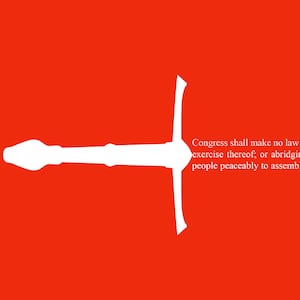A few weeks ago, I went on the Advisory Opinions podcast to convince New York Times columnist (and constitutional lawyer) David French that his ideas about protecting kids from online porn by mandating age verification couldn’t survive constitutional scrutiny. In the interim, a federal district court in Texas enjoined just such a law in Free Speech Coalition v. Colmenero, finding it likely unconstitutional.
Nevertheless, French has persisted. He renewed his call for age verification on the internet (for porn, at least) in a new Times column this past weekend.
French’s thesis can be distilled to two basic arguments: first, there is no constitutional right to “convenient pornography, and second, that established precedent declaring government-mandated age verification unconstitutional is “outdated.” And so, he concludes, the problem is “more technical than constitutional.” But those arguments, and his conclusion, couldn’t be farther from the truth.
Reducing the controversy to one about “convenient pornography” grossly minimizes the First Amendment issues at stake. Like it or not, pornography—and adults’ ability to access it—is constitutionally protected. So despite this attempt to otherize it, what we are talking about is speech. And speech does not become any less speech merely because some people find it “icky” or morally questionable.
BAD ANALOGIES, FALSE EQUIVALENCIES
It would be difficult to imagine French dismissing onerous speech permitting requirements by saying “there is no constitutional right to convenient speech.”
And, in fact, the loss of anonymity was a key reason the Supreme Court struck down a permitting regime requiring door-to-door canvassers to identify themselves, noting that it “may preclude such persons from canvassing for unpopular causes.” So too, when striking down the Child Online Protection Act (COPA), the Third Circuit explained that the First Amendment right of adults to access sensitive content would be chilled if they were forced to give up anonymity.
The chilling effect of eliminating anonymity for First Amendment activity is hardly a matter of “convenience”; it strikes at the very core of our most cherished civil liberty.
French points to “ID requirements for strip clubs and other adult establishments,” arguing that we already require some loss of anonymity to access adult materials offline. Maybe so. But first, few if any laws explicitly require checking IDs—establishments do so voluntarily to avoid potential liability from providing entrance or materials to minors.
More importantly, there is a world of difference between a quick glance at an ID to check date of birth, and uploading identity documents to the internet that create a record of a user’s access.
Online data about us is collected, stored, shared, sold, and used at a galactic level. If anything, the chilling effect of age verification is significantly worse than it was 20 years ago. The effect of creating that kind of digital trail is several orders of magnitude greater than handing over an ID to a bouncer or store clerk—who likely could not remember your name seconds after handing it back.
Comparison of those two drastically different scenarios is reminiscent of the government’s argument in the door-to-door canvassing case: that canvassers necessarily reveal part of their identity by simply showing up at someone’s doorstep, perhaps someone who already knows them. The Supreme Court forcefully rejected that argument, finding that it did not mitigate the constitutional concerns.
French also points to other offline analogs that create “slight difficulties for adults yet remain legal.” But both cases he provides as examples do not support the argument that imposing age verification would survive constitutional scrutiny.
First, in Ginsberg v. New York, the Supreme Court upheld a law prohibiting the sale of “girlie” magazines to minors (whereas they could be sold to adults). But what the law did not require was that merchants verify the age or identity of purchasers—although a wise merchant likely would do so where it was unclear if the purchaser was a minor. The statute in Ginsberg thus actually imposed no difficulties, even slight ones, on adults seeking to purchase the material.
Second, in Young v. American Mini Theatres, the Supreme Court upheld a zoning ordinance regulating the location and number of adult-oriented businesses—finding that the ordinance was not aimed at the businesses’ expression, but rather at reducing the “secondary effects” of crime and violence that plagued neighborhoods with a concentration of such establishments.
But having to travel a little farther to reach a business does not chill a patron’s First Amendment rights; compelling adults to sacrifice their anonymity before accessing disfavored content plainly does.
And in any event, this “secondary effects doctrine” is entirely inapplicable to online porn, both because the impact of expression on a listener is not a “secondary effect,” and because the Supreme Court has explicitly rejected attempts to transpose the doctrine onto the internet as a kind of “cyberzoning”—the doctrine remains limited to physical business locations.
SAME AS IT EVER WAS
Acknowledging the federal court’s injunction against Texas’ age verification law, French lays the blame at the feet of Reno v. ACLU, the 1997 Supreme Court decision striking down the Communications Decency Act, calling its analysis “outdated” and hoping that the court revisits the case in light of the internet’s subsequent development.
That’s a strange argument.
Reno v. ACLU has not left the law frozen in time, nor does it need revisiting.
The principles laid out in Reno remain sound: the First Amendment protects online speech the same as offline speech, and any content-based restrictions must satisfy strict scrutiny—that is, the law must be narrowly tailored to serve a compelling government interest, and must be the least restrictive means of accomplishing the government’s goal. Far from being outdated, this remains the analytical approach the court uses to assess any content-based speech regulation.
French’s real issue is with the facts and evidence presented in Reno. But Reno has never precluded arguing that new facts and circumstances militate a different outcome; it simply held that on the record before the court, the law was unconstitutional. The question is not whether Reno should be revisited, but rather whether these new laws, under new facts, can satisfy the relatively routine constitutional analysis that the Reno court applied.
And that was exactly the approach the court took in enjoining Texas’ law, considering evidence and testimony from the parties and their experts: “The Court does not dispute that online interactions have changed since the Supreme Court’s decisions in 1997 and 2004. But as determined by the facts on the record and presented at the hearing, age verification laws remain overly restrictive. Despite changes to the internet in the past two decades, the Court comes to the same conclusion regarding the efficacy and intrusiveness of age verification as the ACLU courts did in the early 2000s.”
French argues that because “secure credit card use and age verification are practically ubiquitous,” we have evolved past Reno’s assessment that credit card verification is “effectively unavailable.” In doing so, he misses the true meaning of “effectively unavailable.” Reno, and the cases that followed, found that credit card age verification failed to render the law “narrowly tailored” because it doesn’t actually verify age.
And nothing has changed in that respect. Neither entering a credit card nor uploading a picture of an ID actually verifies that it is that person who has provided the identity information. It’s just as easy to borrow an older sibling’s ID as it is to borrow a parent’s credit card. And while there are new forms of age verification that utilize selfies or video, a quick Google search turns up countless pages on fooling such systems using free, easy-to-use software. Whatever the advances in technology since 2008, they have not yet solved this fatal problem.
Reno and its progeny also held that parental controls and content filtering were less restrictive alternatives than age verification. French argues that we have now learned they are “wholly inadequate.”
But is that so? French doesn’t provide a basis for this claim.
And, in fact, Judge Ezra noted that Texas’ own studies tended to show that content filtering and parental controls would be more effective, and better tailored, than age verification.
Perhaps French believes such measures are inadequate because parents lack the knowledge and ability to implement them. But that does not allow the government to sidestep them as a less restrictive means: “A court should not assume a plausible, less restrictive alternative would be ineffective; and a court should not presume parents, given full information, will fail to act.”
Or, perhaps he believes that minors will find a way around them. But that argument is a strike against the law’s constitutionality. French acknowledges that minors will also find a way around age verification (and they certainly will). That renders age verification itself ineffective, and as a result, not narrowly tailored. Simply showing that a less restrictive means has flaws is of no moment; to survive constitutional scrutiny, the government must show that its solution will be more effective.
To this, French replies that “creating additional hurdles to the acquisition of porn still matters.”
Whether it matters is an opinion on which people can disagree. But whether the government can constitutionally impose such hurdles on adults is another matter entirely. And it is clear that neither the First Amendment, nor the internet, has changed enough to allow that.
French does get one thing right: This is not a partisan issue. It is in fact a free speech issue.
Some may be willing to tolerate infringements on the First Amendment to achieve marginal—if any—results. Others believe that moral panic does not justify encroachments on fundamental liberties that will surely beget further encroachments.
Count me among the latter.











